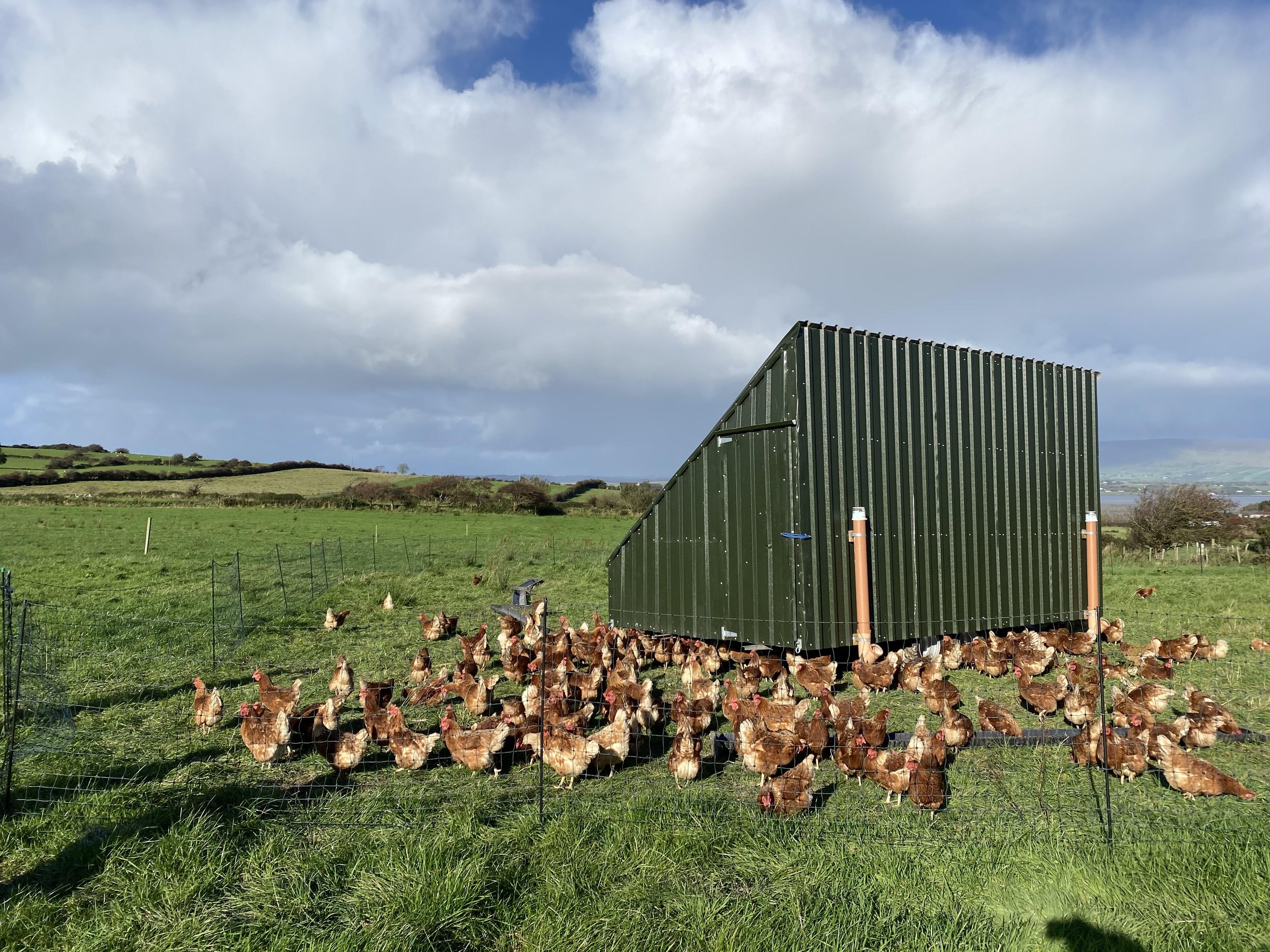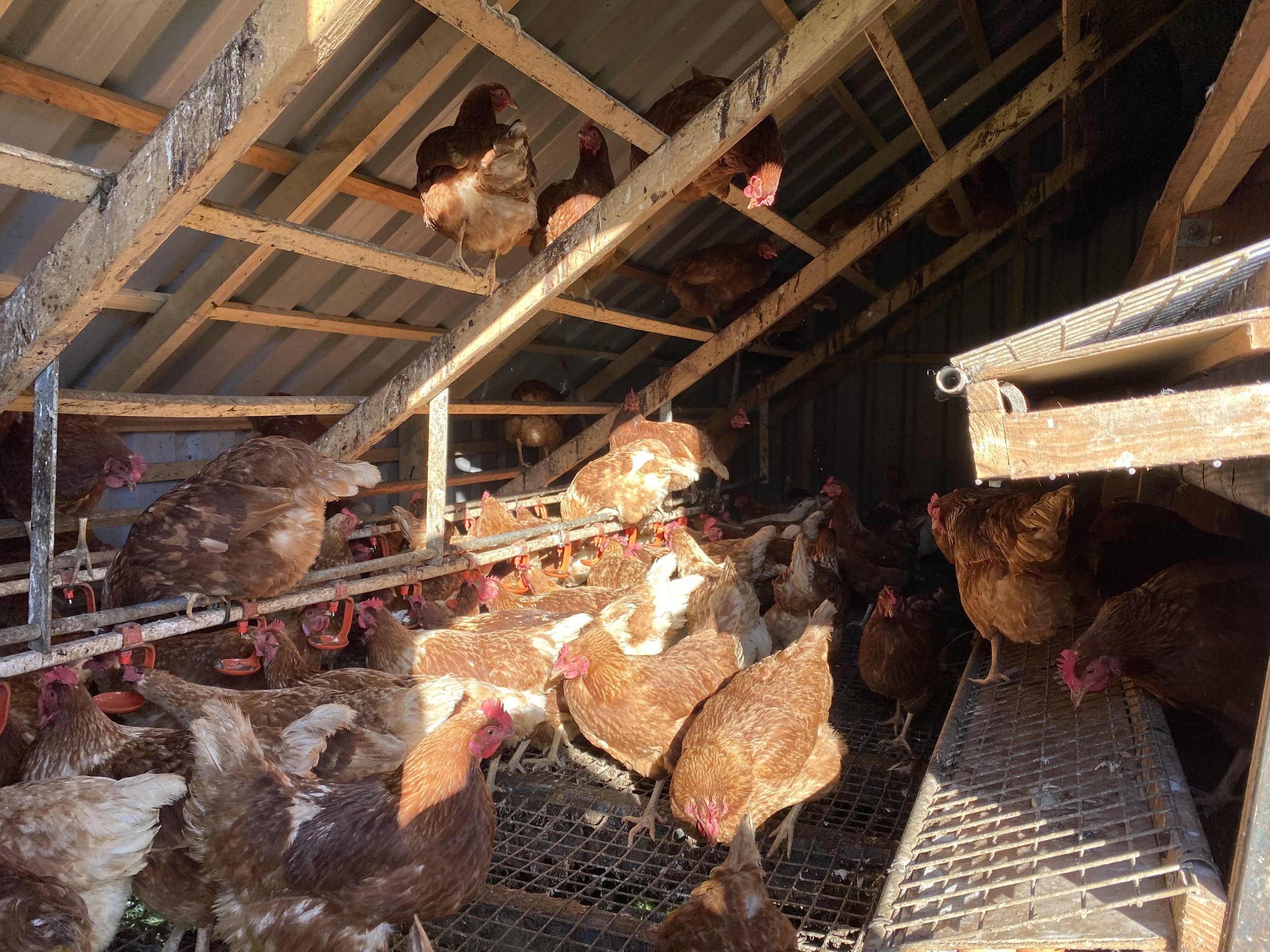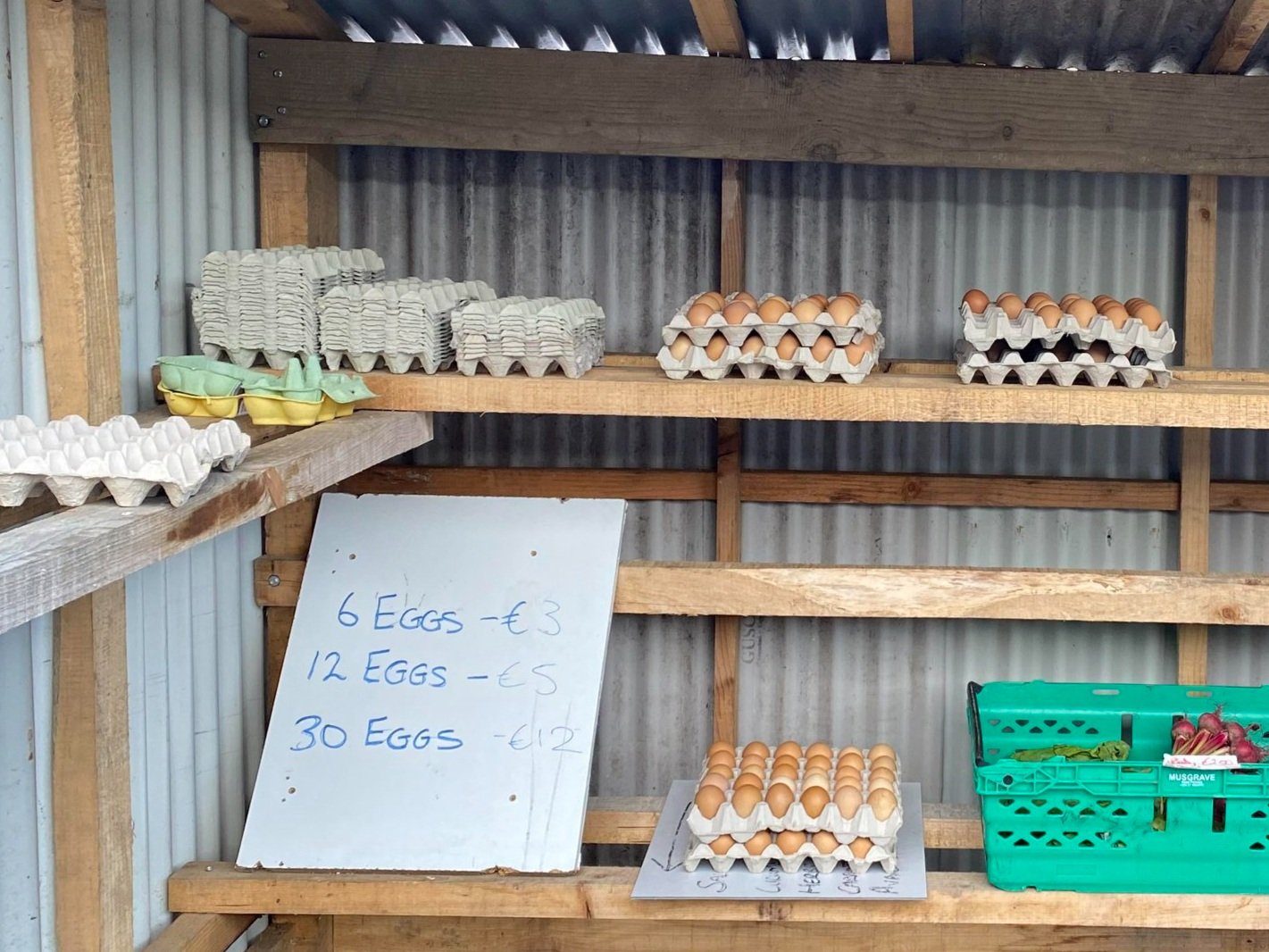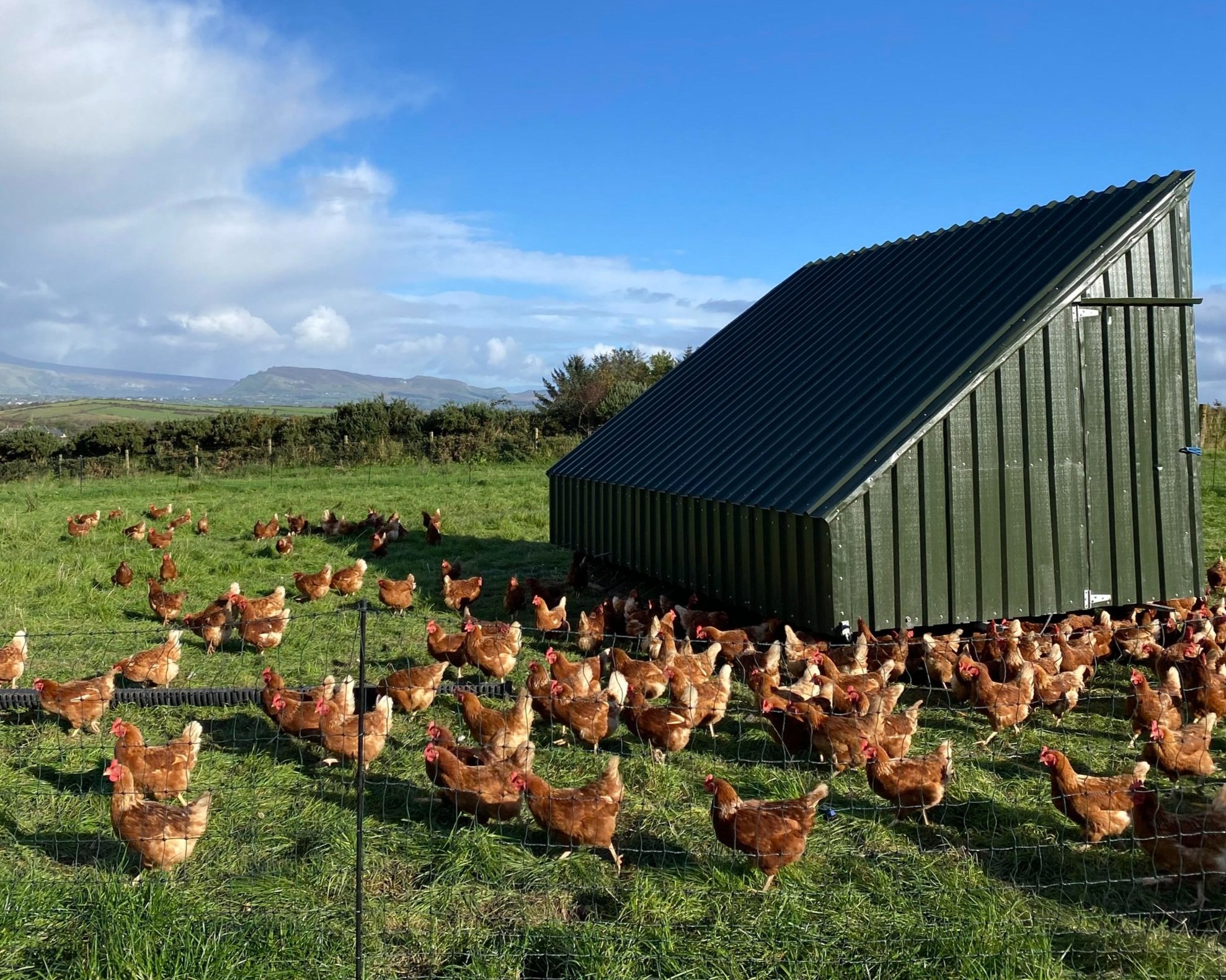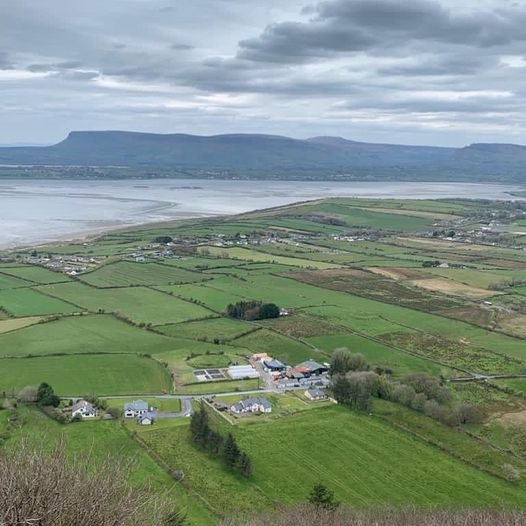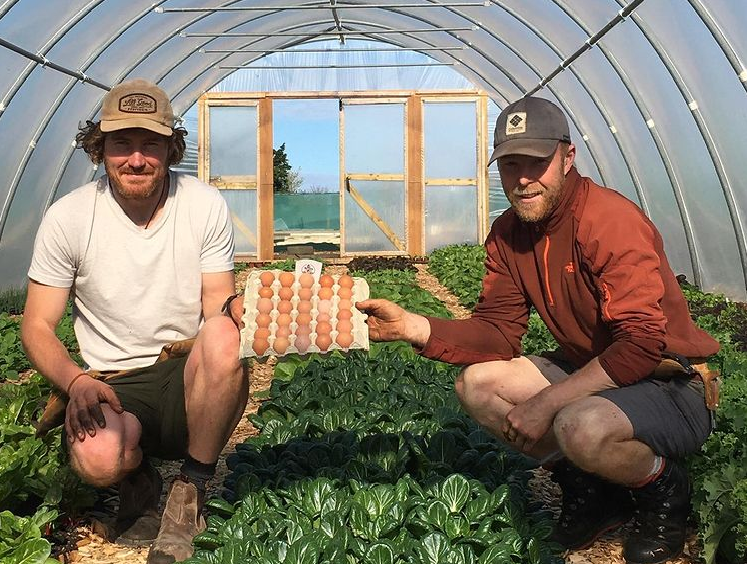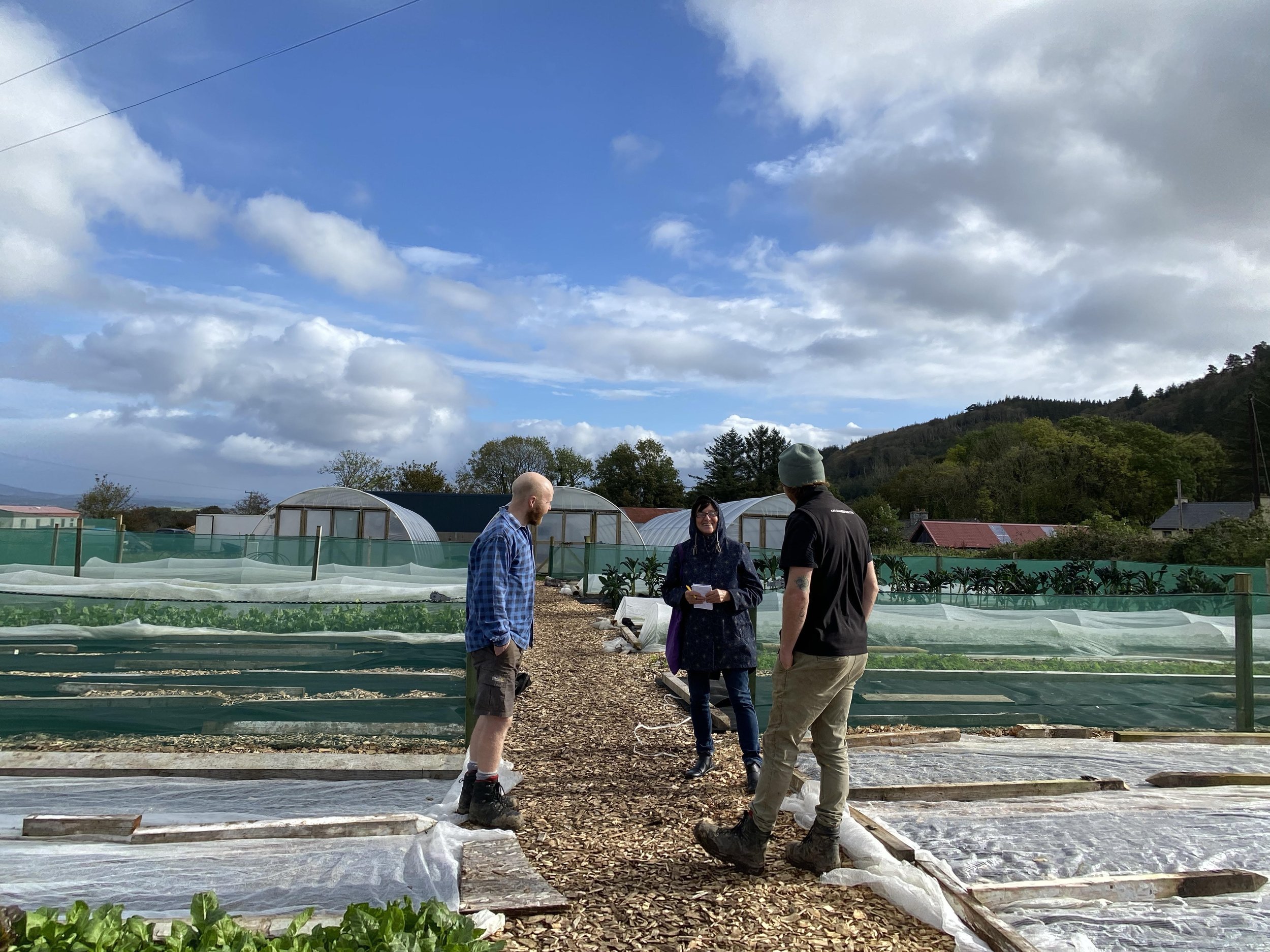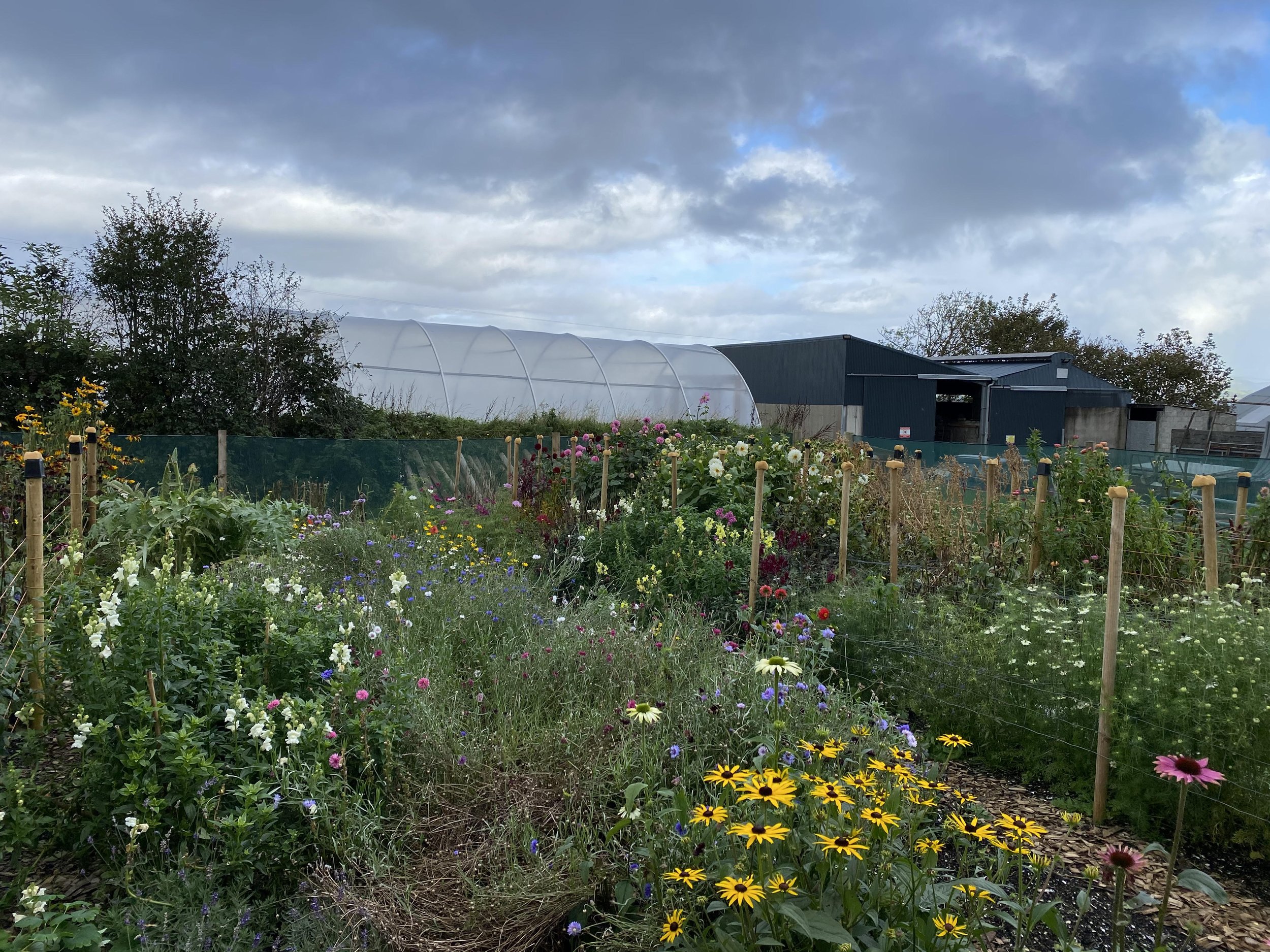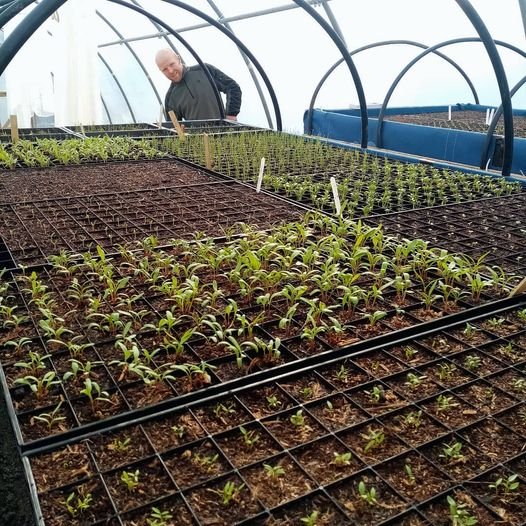Knocknarea Farm - Farming for the Future
“We believe Ireland should be able to produce its own nutrient-dense food grown in a manner that makes the soil and landscape more abundant and full of life for generations to come.”
When two young famers kneel down in the middle of a field, pull the grass apart and say: “Look at the soil, it’s teeming with life!”, you know you are on to something. Sean Gilligan and Rob Kennedy are passionate about what they do and humble at the same time. “We learn more every day”, they say in unison. Their working day usually starts with the same routine every morning: Moving the self-built ‘Egg-mobile’ so the 350 hens get on to clean pasture. “It takes about twenty minutes”, says Rob. By adopting a sort of mob-grazing they have witnessed an immense improvement in the quality of the grass. Sean points out the larger grass blades and Rob says they have seen an increase in red and white clover. The pasture looks really lush and the flock of Lohmann Brown’s seem to be very happy. “The hens add an abundant amount of fertility to the pasture”, explains Rob and Sean points out that “it allows the hens to express their full vitality and live a good life”. Apart from an organic ration they are also fed crushed Oyster shells for minerals. Suffice to say the Knocknarea Farm eggs taste delicious and are a big seller. When we visited in mid -October they were just preparing one of the polytunnels for housing the hens over the winter months.
Regenerative Agriculture
The Knocknarea mountain looms large over Knocknarea Farm in Upper Strandhill and the view over Sligo bay with Benbulbin on the other side is breath taking. Sean and Rob met in the University of Galway in 2009 and throughout their studies talked about setting up a farm. “We got serious only about two years ago after we came back from travelling”, they tell us. They started the mixed farm in 2021 using regenerative principles, taking over from Sean’s parents. Asked about their ethos, Sean says: “We believe Ireland should be able to produce its own nutrient-dense food grown in a manner that makes the soil and landscape more abundant and full of life for generations to come.”
No dig method
The vegetable enterprise on the farm consists of three large polytunnels, a half-acre of field vegetables and a cut flower garden. To start up they used Envirogrind compost and all the foot paths are mulched with wood chips. Having visited Jim Cronin from Co. Clare, one of the leading organic market gardeners and a no dig ambassador himself, they got inspired by his composting scheme and planning a big compost area. They produce a wide range of vegetables in the polytunnels like tomatoes, cucumbers, courgettes, squashes (pattypan), carrots, French beans, sweet peas, fennel, lettuces and oriental and baby leaves and more. Very interesting is their take on microgreens like pea sprouts and sunflower shoots. “We grow them because they are really nutritious and we also use them in our salad bags.”
Adopting the No Dig method, they are joining a growing number of vegetable producers, who believe this is the best way of growing food. When asked why they believe in this method Rob says: “No-dig market gardening aims at enhancing and building life in our soil,” and Sean is convinced that “our veg box contains seasonal items which pack taste, flavour and most importantly nutrients thanks to the life in our soil.” Although not organically certified they a are chemical free farm and only use natural growing methods.
From farm to restaurants
One of the most exciting developments are the connections to established and new restaurants in the locality. We know that the chefs in Stoked in Strandhill and Fish & Bean in Rosses Point are more than delighted to be able to use local produce for their menu. Knocknarea Farm also supplies the Dunes Bar, Pasta Fresca and the new Taco de Town stall at the Strandhill Peoples Market.
CSA Scheme and Farm Shop
Customers can buy direct by signing up to their CSA (Community Supported Agriculture) Veg & Egg Box Scheme from a 4-week membership of pasture raised eggs to a seasonal vegetable bag. They initially started selling direct through an honesty box stall outside the farm and have now a new farm shop. During the season they sold besides the polytunnel crops spinach, turnips, beetroot, kohlrabi, onions, kale, cabbage and garlic and their tasty salad bags. They also added organic raw milk from Gleannbui Farm to their shop. Another interesting addition were their colorful mixed cut-flower bouquets.
New Plans
Sean and Rob are not only hard working and passionate about what they do, but also forward thinking. What is next we ask: “The winter holds lots of new exciting projects, a little rest and reflection on what we have learned this year”, they answer. They plan to increase their flock of hens to 600 and are building a new moveable 6 by 10 m hen house, the “Egg-Mobile 2”. Another exciting enterprise will see free range pigs roaming on a five acre woodland.
Their vegetable enterprise will get another polytunnel and as the farm is situated very exposed on a hill they will plant a windbreak with willow and Scots pine. A soft fruit production area is also in the pipeline. For visitors, Sean and Rob hope to be able to offer farm tours. They are definitely not short of ideas and we could feel their enthusiasm, when they spoke about their future. 2021 was their first year with full production and they were very pleased with the support from the local community: “As young farmers it builds our confidence going forward and we can make it work long term.”
We are exited about the future of Knocknarea Farm and seeing what they have achieved in a very short time we have every confidence they will achieve their goals which is not only great for the local community, but also important for the Sligo food evolution and in a much wider context for the future of our planet.
Here is Sean Gilligan uncovered
What is your favourite food? Lamb.
Finish the sentence: A farmer is someone who produces healthy nutrient dense food while enhancing the environment around them .
The country you travel for food: Morocco.
Three things you always have in your larder/fridge? Milk, butter, salad.
What is your most used gadget? Phone.
Do you read gardening books and which one do you come back to? Not gardening books, but I do read about pasture management. I love “The art and science of grazing” by Sarah Flack.
Who is your inspiration (not necessarily from the food/garden world): Joel Salatin. (An American farmer, lecturer and author. Salatin's philosophy of farming emphasizes healthy grass on which animals can thrive in a symbiotic cycle of feeding.)
What are you currently listening to? Regenerative Ag podcast.
Something people don’t know about you? I have a big interest in dry stone walling.
What will be hot in 2022? Knocknarea farm forest raised pork.
Here is Rob Kennedy uncovered
What is your favourite food? Poached eggs on sourdough bread.
Finish the sentence: A farmer is a steward of the land and produces food for their local community.
The country you travel for food: France or India.
Three things you always have in your larder/fridge? Eggs, butter and tea.
What is your most used gadget? Cordless Bluetooth headphones. So nice when working to listen to books or podcasts.
Do you read gardening books and which one do you come back to? The Market Gardener by Jean Martin Fortier and The Lean Farm by Ben Hartman.
Who is your inspiration (not necessarily from the food/garden world): Joel Salatin.
What are you currently listening to? No-Till Podcast.
Something people don’t know about you? I love going to saunas and cold dips.
What will be hot in 2022? Our Knocknarea farm shop.


